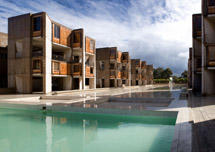
Salk Institute Cancer Center
Reuben Shaw, Ph.D., Director
La Jolla, California
Main:
(858) 453-4100
The Salk Cancer Center at the Salk Institute for Biological Studies was established in 1970 and received its NCI designation in 1973. Today, the center includes 31 faculty members, and more than 500 students, postdoctoral fellows, and technical staff work in Salk Cancer Center labs. The center’s mission is to understand fundamental aspects of biology related to cancer; accelerate translation of groundbreaking discoveries into clinical opportunities for diagnostics and therapeutics; develop innovative tools and technologies to better treat, diagnose, and prevent cancer; and train the next generation of cancer scientific leadership. The organization and membership of the Salk Cancer Center promotes interdisciplinary research and offers a unique training environment for cancer researchers due to the backgrounds and interests of the faculty and trainees.
Discoveries at the Salk Cancer Center have spurred collaborative partnerships with other NCI-Designated Cancer Centers (Penn Medicine’s Abramson Cancer Center and University of California San Diego’s Moores Cancer Center), nonprofit institutes (Translational Genomics Research Institute, or TGen), philanthropic foundations (Lustgarten Foundation and Stand Up To Cancer), and pharmacology firms (Merck) to translate promising laboratory discoveries into lifesaving treatments for patients with cancer.
In addition to research, the center has an active program of graduate and postdoctoral education and training. The Salk Institute and the University of California San Diego’s Division of Biology conduct a joint graduate program.
Research at Salk Cancer Center
Research at the Salk Cancer Center is aimed at understanding fundamental aspects of biology related to cancer with the ultimate goal of reducing cancer incidence, morbidity, and mortality. The center’s work is based on the philosophy that basic research in molecular, cellular, and developmental biology has the power to illuminate underlying causes of cancer, often in unexpected ways. The interactive research at Salk frequently produces significant insights into basic mechanisms of cell growth regulation underlying cancer. Salk’s collaborative research is organized under two major programs.
Genetic, Epigenetic, and Immune Circuits in Cancer Program focuses on the genetic contribution to cancer and how it is further altered by epigenetic controls as well as the surrounding tumor microenvironment — particularly the immune system. This program uses a multifaceted approach that includes physical studies of gene function, dissection of genetic and epigenetic networks, technological development that leads to novel diagnostic markers, and new therapeutic approaches.
The Animal Models of Cancer and Therapeutics Program study autochthonous mice (mice who are local to the Salk Cancer Center’s region) to understand distinct facets of tumor biology in the native environment and to combine the development and application of novel therapeutic approaches to different model systems. This program pursues three avenues of research:
- exploring complex tumor biology using mouse models, like roles of tissue context, stem cell populations, and differentiation
- developing novel therapeutic approaches using small molecule and biological- and viral-based methodologies
- understanding metabolic rewiring in distinct tumor types and driver mutations and developing novel metabolism-based diagnostics and therapeutics
Salk has a long legacy in cancer research and has made many landmark discoveries:
- understanding the structure of alanine-tRNA’s role in connecting DNA and protein synthesis
- pioneering the connection between viruses and cancer
- discovering tyrosine phosphorylation as a driver of cancer
- researching early oncogenes and developing lentiviral tools for gene therapy
- uncovering nuclear receptor superfamily and discovering how modulation of androgen receptors, estrogen receptors, and retinoids serve as cancer therapeutics
- identifying P53 as a guardian against genomic damage and other stresses
Select Scientific Initiatives at the Salk Cancer Center
- In January 2013, the Salk Cancer Center joined the University of California San Diego’s Moores and the Sanford Burnham Prebys NCI-Designated Cancer Centers in launching the San Diego NCI Cancer Centers Council (C3). C3 was created to leverage the distinct resources and talents of the three centers and to build a new structure and process. This has increased interaction and collaboration between the cancer centers’ faculties, leading to a deeper understanding of cancer and, ultimately, the development of new and better treatments.
- “A SU2C Catalyst® Trial of a PD1 Inhibitor With or Without a Vitamin D Analog for the Maintenance of Pancreatic Cancer”: Salk investigators have uncovered the role of the vitamin D receptor as being the master of the pancreatic tumor microenvironment and discovered that a chemically modified form of vitamin D reprograms the cancer environment in a way that may allow pembrolizumab (Keytruda) to invade and destroy the tumor — offering a new approach to treating pancreatic cancer.
- Salk and Indivumed GmbH have established a multiyear strategic alliance to secure, preserve, and analyze human cancer tissue and annotated clinical data from consenting patients around the world to advance research in precision oncology and personalized medicine using the highest-quality molecular and clinical data in cancer.
* Information on this cancer center profile was provided by the Salk Cancer Center.